
Do you snore loudly or wake up feeling exhausted? If so, you might be dealing with sleep apnea, which is a common but serious sleep disorder that affects millions of people. However, you don’t have to suffer in silence. At Scottsdale Cosmetic Dentistry, we offer comprehensive, dentist-approved solutions to help you breathe easier and enjoy a restful night’s sleep.
In this guide, we’ll cover everything you need to know about sleep apnea: what it is, why it matters, and how our team can help you reclaim your nights and your energy.
What Is Sleep Apnea?
Sleep apnea causes one to repeatedly stop breathing during sleep. These persistent interruptions can disrupt your sleep, lower oxygen levels, and, if left untreated, contribute to serious health risks like heart disease.
The three types of sleep apnea are:
- Obstructive Sleep Apnea (OSA) – OSA is the most common, and it occurs when the muscles in the throat relax too much, partially or completely blocking airflow.
- Central Sleep Apnea (CSA) – CSA happens when the brain fails to signal the breathing muscles properly, which leads to disrupted breathing during sleep.
- Complex Sleep Apnea Syndrome – This is a combination of OSA and CSA.
Since obstructive sleep apnea (OSA) is the most common, it’s the one we focus on treating at Scottsdale Cosmetic Dentistry.
6 Signs and Symptoms of Sleep Apnea
Sleep apnea can be tricky to diagnose since it happens while you’re sleeping (obviously!). However, some key symptoms can signal a problem:
- Loud, persistent snoring
- Gasping or choking during sleep
- Excessive daytime fatigue
- Morning headaches or dry mouth
- Difficulty concentrating or memory issues
- Mood swings or irritability
If any of these sound familiar, it’s time to take action. Sleep apnea is more than feeling tired; it’s a serious health concern that can lead to:
- High blood pressure
- Heart disease
- Stroke
- Diabetes
- Chronic fatigue
How Is Sleep Apnea Diagnosed?
A proper diagnosis usually requires a sleep study called a “polysomnography.” This can be done in a sleep lab or with a home sleep test. During the study, sensors monitor your breathing patterns, oxygen levels, and sleep disturbances to determine the severity of your sleep apnea.
Once diagnosed, you can start exploring treatment options—and that’s where we come in!
How Scottsdale Dentists Can Help Treat Sleep Apnea
Many people think treating sleep apnea means using a bulky CPAP machine forever, but that’s not always the case. In fact, dentists play a crucial role in treating obstructive sleep apnea with comfortable, non-invasive solutions. Here’s how we can help:
1. Oral Appliance Therapy
If you have mild to moderate obstructive sleep apnea, a custom-fitted oral appliance can be a game-changer. This small, mouthguard-like device is designed to keep your airway open by gently repositioning your lower jaw and tongue while you sleep.
Benefits of Oral Appliances:
- Small, lightweight, and easy to wear
- No noisy machines or tubes
- No electricity required (perfect for travel!)
- More comfortable than CPAP therapy
At Scottsdale Cosmetic Dentistry, we create custom oral appliances that fit perfectly and effectively keep your airway clear. No more snoring and no more restless nights!
2. CPAP Therapy
For those with moderate to severe sleep apnea, a continuous positive airway pressure (CPAP) machine may be recommended. A CPAP machine gently pushes a steady stream of air through a mask to keep your airway open.
While CPAP therapy is effective, many people find it uncomfortable or difficult to tolerate. That’s why oral appliance therapy is a popular alternative for those who struggle with wearing a CPAP machine.
3. Lifestyle Changes to Reduce Sleep Apnea Symptoms
In addition to oral appliances or CPAP, making simple lifestyle adjustments can help reduce sleep apnea symptoms:
- Maintain a healthy weight. – Excess weight, especially around the neck, can contribute to airway obstruction.
- Sleep on your side. – Back-sleepers may struggle more with breathing because it allows the tongue and soft tissues to block airflow.
- Avoid alcohol and sedatives. – These substances relax throat muscles, which makes airway blockage more likely.
- Stick to a consistent sleep routine. – Going to bed and waking up at the same time each day improves sleep quality.
4. Surgery (In Severe Cases)
In rare cases where other treatments don’t work, surgical options may be considered. These may include removing excess throat tissue, repositioning the jaw, or even implanting a small device to keep the airway open.
At Scottsdale Cosmetic Dentistry, we focus on non-invasive solutions first so you have a comfortable, effective treatment plan tailored to your needs.
 Why You Shouldn’t Ignore Sleep Apnea
Why You Shouldn’t Ignore Sleep Apnea
Untreated sleep apnea isn’t just about loud snoring or feeling groggy. It can have serious health consequences over time. Here’s why getting treatment is so important:
- Reduces risk of heart disease and stroke
- Lowers blood pressure
- Improves energy levels and concentration
- Prevents accidents caused by drowsy driving
- Enhances overall quality of life
If you’ve been putting off treatment, consider this your wake-up call—literally! Your health and well-being are worth it.
Ready to Sleep Better? Let’s Get Started!
If sleep apnea is disrupting your life, you don’t have to suffer in silence. At Scottsdale Cosmetic Dentistry, we offer custom oral appliances and expert guidance to help you breathe easier, sleep better, and wake up feeling refreshed.
Schedule a consultation with our Scottsdale dentist today.
